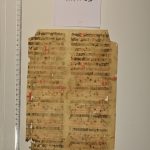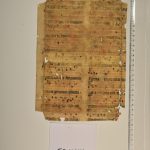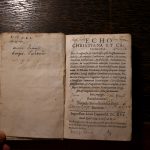The carrier book contains the anonymously published work of Tamás Balásfi (1580–1625), who was born in Kolozsvár (Cluj-Napoca in today Romania) but spent most of his life in Pozsony (Bratislava, today Slovakia), Péter Pázmány’s favourite priest, among others bishop of Vác and Pécs, a prolific author and passionate defender of the Roman Catholic faith against Protestantism. Éva Knapp, in her study published in 2017, listing 40 new volumes of the University Library’s collection of books printed before 1635, pointed out, that the book was restored in the second half of the 20th century, but the parchment leaf detached from its binding can no longer be identified (cf. Éva Knapp, “A budapesti Egyetemi Könyvtár 1635 előtti ősállományának negyven új kötete“ [Forty new volumes of the collection of books printed before 1635 in the University Library Budapest], in Librum evolvo. Eszme- és könyvtörténeti tanulmányok a XVI–XX. századból [Studies in Intellectual History and in History of Books from the 16th to 20th centuries], Budapest: Reciti, 2017, 225-254, here: 236). In December 2018 our research group identified the fragment among the detached manuscript fragments stored in separate boxes in the Manuscript Department of the University Library in Budapest.
The chant Quem non praevalent, rubricated mostly as a hymn, is actually a responsory trope, which comes up in the Cantus Index from German and Austrian sources (Klosterneuburg, Gottschalk Antiphoner) at the end of the Matins and in the second Vespers of Epiphany. Furthermore, this chant was also applied at the Compline of Epiphany in Esztergom besides the hymn division of Hostis Herodes (Ibant Magi). (See Gábriel Szoliva ed., Psalterium Strigoniense Venetiis 1523 [= Musicalia Danubiana Vol. 25 (Budapest: Hungarian Academy of Sciences, Research Centre for the Humanities, Institute for Musicology, 2015), f. 112r; for further information about the hymn see ibid, 53). Fully notated version of the chant is known only from Zagreb, its melody stands very close to the version found in the fragment. See Zagreb, Metropolitanska knjižnica, MR 21, f. 9v–10r (new foliation!); also ibid MR 4, p. 9–11. The variants found in Zagreb also show simliarities to the melodic versions in Klosterneuburg. See Debra Lacoste, “The identification of Quem non praevalent in Klosterneuburg, Augustiner-Chorherrenstift – Bibliothek, 1013.”, De musica disserenda 9/1-2 (2013), 157–173.
The choice of melody of the hymn A Patre Unigenitus is essential. This melody was not used in Esztergom, its notated source is known only from Zagreb, where it was sung on the melody of A solis ortu. However, the ad notam in the fragment corresponds to the unique Hungarian (Esztergom) melody of the hymn for John the Baptist, the De Patre Verbum prodiens. (See Janka Szendrei, “A himnuszok dallamválasztása jellemző a liturgiákra”, Magyar Egyházzene 4/3 (1997), 307–314, and exspecially 310. See also Psalterium Strigoniense Venetiis 1523, f. 112r) The choice of melody may have been justified by the similarity of the beginning of the text (A Patre… De Patre…). As a conclusion, we can assume the Hungarian provenance of the fragment.
Zsuzsa Czagány, Gabriella Gilányi, Gábriel Szoliva





